Image
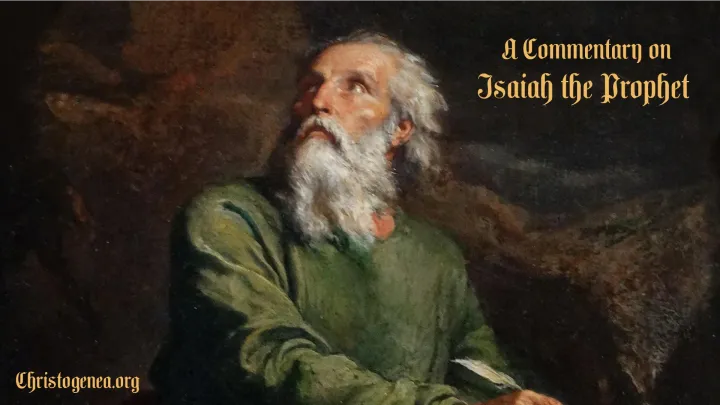
Christogenea is 100% reader supported. If you find value in our work, please contribute and help to keep it going! See our Contact Page for more information!

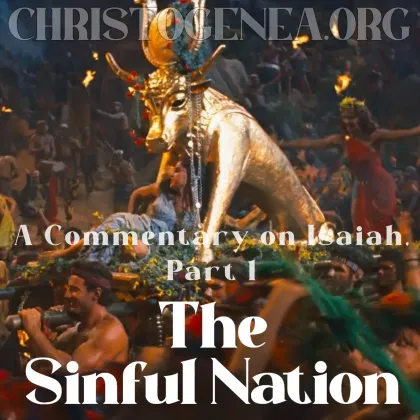
Here we are going to venture a commentary on the book of the prophet Isaiah. While it seems as though it may be a long journey, and I am persuaded that it may take as long as a year and a half to complete, the Genesis commentary had taken that long to complete. I can only pray that it is worth the time and effort in the end. As we discussed here last week, I am still pondering some supplementary material for the Genesis commentary, so I may occasionally revert to that in the near future. The Book of Isaiah is nearly as long as the Book of Genesis, about 37,000 words in the King James Version where Genesis has just over 38,000, and the dives into ancient history and some elements of the language may be nearly as deep. However we also hope to elucidate its close relationship to the Gospel of Christ and the epistles of His apostles in ways beyond those we have already discussed in our New Testament commentaries.
Here we are going to venture a commentary on the book of the prophet Isaiah. While it seems as though it may be a long journey, and I am persuaded that it may take as long as a year and a half to complete, the Genesis commentary had taken that long to complete. I can only pray that it is worth the time and effort in the end. As we discussed here last week, I am still pondering some supplementary material for the Genesis commentary, so I may occasionally revert to that in the near future. The Book of Isaiah is nearly as long as the Book of Genesis, about 37,000 words in the King James Version where Genesis has just over 38,000, and the dives into ancient history and some elements of the language may be nearly as deep. However we also hope to elucidate its close relationship to the Gospel of Christ and the epistles of His apostles in ways beyond those we have already discussed in our New Testament commentaries.
A Commentary on Isaiah, Part 1: The Sinful Nation
The prophet Isaiah describes himself as the son of Amoz, and little more can be known about him with any absolute certainty, aside from the apparent fact that he was a man of Judah. Being a man of Judah, he could have been of the tribe of Judah or of Levi, or perhaps even of Benjamin, and the only indication is found in circumstantial evidence later in his writing. There it is also evident that Isaiah had been married with children, as he recorded in chapter 7 that he had been told to go to meet Ahaz the king, and to bring “Shearjashub thy son” along with him. If this were the only reference to a son, we may think the Hebrew term בן or ben (# 1121), which is literally a son, was being used metaphorically, as it is used on many occasions. But in the subsequent text there is another indication that he did indeed have a wife and children, and very much in the same fashion that the prophet Hosea had children – as an example to the people for whom he had prophesied.
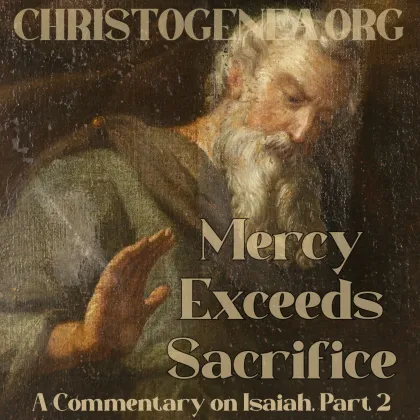
In the opening presentation of this commentary on Isaiah we had sought to focus upon the historical circumstances in which the prophet had begun his ministry. So with the evidence we presented, Jonah had already prophesied some decades earlier, and it seems that the prophet Hosea had already begun his ministry, which, like that of Isaiah, had also endured to the time of Hezekiah. The prophet Amos had also already begun, even if his ministry had evidently not endured for as long as that of Hosea. Now along comes Isaiah, in what appears to be the final years of the rule of Uzziah king of Judah, some time before 740 BC. We have also explained, from evidence which Isaiah provides in chapters 7 and 8 of his prophecy, that he is a man a Judah, that he was married and had at least one child, and he was of some importance to the degree where he could have the attention of the king, and he could command scribes and priests. So it seems that Isaiah may even have been a man of rank in the court of the king before he started his prophetic ministry.
In the opening words of his prophecy, in the first nine verses, there is a blanket condemnation of the entire nation of Israel, which includes both Israel and Judah, and it is not entirely certain that anyone in Israel proper had yet been taken into captivity, but it is evident in the inscriptions that many Israelites dwelling north of Israel proper, in lands already captured by the Assyrians, had most likely been taken, and as we have also seen, as early as the time of Ahab the Israelites had been sending men north to fight against the Assyrians, in league with the Syrians of Damascus and other towns which at one time had been governed by Judah. So concerning this struggle, which is evident in the prophecy which Jonah had made concerning Jeroboam II, and the Assyrian success against Aram and Israel after the time of Jeroboam, it is difficult to tell whether Isaiah is speaking prophetically, or if he is speaking as if the news were a current or recent event, where he announced in verse 7 that “Your country is desolate, your cities are burned with fire: your land, strangers devour it in your presence, and it is desolate, as overthrown by strangers.”
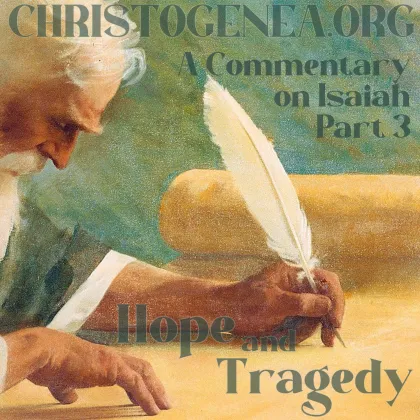
In Isaiah chapter 1 we hope to have elucidated the commonality of the opening message of the prophet with those of his contemporaries, Hosea and Amos. In verses 2 through 5 the prophet upbraids the children of Israel for rebelling against Yahweh their God, and departing from Him. Then in verses 6 through 9 the inevitable result of that rebellion is described, where strangers, people of other nations and races, have devoured their land. This prophecy also parallels other similar prophecies of Scripture, both contemporary and remote. One example is found in Joel chapter 1, who wrote in reference to the land of Israel some short time after the deportations of Israel and much of Judah by the Assyrians, and said “4 That which the palmerworm hath left hath the locust eaten; and that which the locust hath left hath the cankerworm eaten; and that which the cankerworm hath left hath the caterpiller eaten.”
But then this also parallels another example, a more distant prophecy in Revelation chapter 9, where there is a vision of the hordes of Arabia who tormented the Byzantine Empire for over a thousand years: “2 And he opened the bottomless pit; and there arose a smoke out of the pit, as the smoke of a great furnace; and the sun and the air were darkened by reason of the smoke of the pit. 3 And there came out of the smoke locusts upon the earth: and unto them was given power, as the scorpions of the earth have power. 4 And it was commanded them that they should not hurt the grass of the earth, neither any green thing, neither any tree; but only those men which have not the seal of God in their foreheads. 5 And to them it was given that they should not kill them, but that they should be tormented five months: and their torment was as the torment of a scorpion, when he striketh a man.”
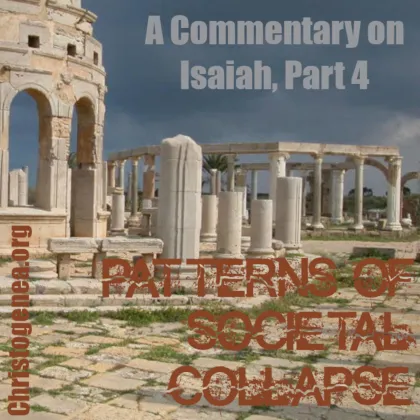
A Commentary on Isaiah, Part 4: Patterns of Societal Collapse
Isaiah chapter 2 had opened with a promise of hope, which was evidently a vision for some time far off in the future, since it was followed by a much more immediate condemnation and imminent judgment of the people of Israel of Isaiah’s own time. This condemnation was for greater Israel, since it had made references to the cedars of Lebanon, the oaks of Bashan, which were allegories for various of the tribes of ancient Israel, and also to the ships of Tarshish, the ships by which the children of Israel had spread themselves abroad. In this condemnation they were condemned for their sorceries, for their idolatry, for their haughtiness, and because they had pleased themselves in the children of strangers, which is fornication or race-mixing.
Therefore we must understand that since there was a message of hope which had accompanied the condemnation of Israel for their sins, that Yahweh God had never intended to destroy Israel entirely, but rather, His intention was, and is, to punish them for their sins, so that they would ultimately conform to His will and through their conformance, He could fulfill the things which He had promised to their fathers. As we also hope to have illustrated, it is very likely that by the time Isaiah had written these words, the prophet Amos had already completed the course of his prophecy, and in Amos chapter 3 we read: “1 Hear this word that the LORD hath spoken against you, O children of Israel, against the whole family which I brought up from the land of Egypt, saying, 2 You only have I known of all the families of the earth: therefore I will punish you for all your iniquities.”
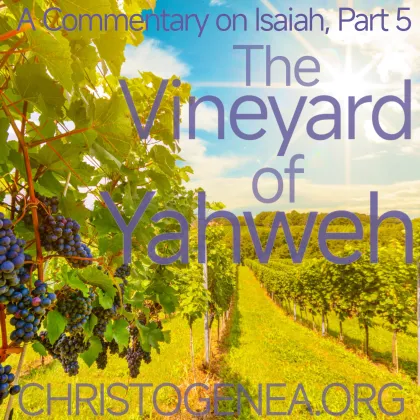
A Commentary on Isaiah, Part 5: The Vineyard of Yahweh
Here we shall continue our discussion of this second vision which had been recorded in the words of the prophet Isaiah, which runs through four chapters of the book, and now upon our coming to chapter 5 we are nearing its end. This chapter contains a rather brief song of a vineyard, and it is within this context that we should also consider the parable of the vineyard, as well as the parable of the vineyard workers, which are found in the Gospel of Christ. This song is a song of lamentation, accompanied with a message of a coming punishment. In the words of the later prophet Jeremiah, Yahweh further laments His vineyard, and then even later, Yahshua Christ makes an example of a portion of its history, however in His Gospel it is also evident that the lamentation shall ultimately turn to wrath, and that wrath is expressed in even stronger terms in His Revelation. In these messages it is fully evident that the vineyard is an allegory for the society of His people, in which the grapes are metaphors for the people themselves.
As we had discussed in Isaiah chapter 3, where the punishment of the people of Judah for their sins was first announced by the prophet, it is evident that the Patterns of Societal Collapse which had been described there are aspects of that punishment, and they had evidently already come upon Judah even before Isaiah had begun writing. They are the inevitable result of sin which would lead to the breakdown of society and its ultimate punishment. So in the course of the execution of that punishment, the great, wise and mighty men of the society would be neutralized, in one way or another. Then while the youth are magnified and the women caught up in feminism, they would all be humbled by the violence of their enemies. The men would end up dead, and the women, scarred with their own excess of debauchery, would be laid bare in the face of their enemies.

Here we shall continue our commentary on Isaiah with the later half of chapter 5, where we are still in the second vision that had been recorded in the words of the prophet. As we had explained, this vision runs through four chapters of the book, and now we are nearing its end. In the opening verses of the chapter there is a rather brief song of a vineyard. That the vineyard serves as an allegory for the children of Israel was stated explicitly where we read in verse 5 that “…the vineyard of the LORD of hosts is the house of Israel, and the men of Judah his pleasant plant…” Later in Isaiah, in chapter 18, there is yet another description of a vineyard where we read what seems to have been a rather ominous warning: “5 For before the harvest, when the bud is perfect and the sour grape is ripening in the flower, He will both cut off the sprigs with pruning hooks and take away and cut down the branches.” While we should not get too far ahead of ourselves, for now it may suffice to say that the vineyard in Isaiah chapter 18 is also an allegory for the children of Israel, and as we had already explained in relation to this chapter, it also relates to the Gospel of Christ and the Parable of the Vineyard, as well as the visions of the harvests of the grapes found in chapter 14 of His Revelation.

A Commentary on Isaiah, Part 7: A Virgin Shall Conceive
Thus far in Isaiah we have seen three recorded visions, first in chapter 1 where there was a general condemnation of Israel, then in chapters 2 through 5 where there was another condemnation of Israel, and a lengthier condemnation concerning Judah, and finally, in chapter 6, there was another vision in which it was proclaimed that the people would be blind, and deaf, ostensibly so that the Will of Yahweh described in the prophecies which concerned them would be fulfilled. That is how Isaiah understood it, where in verse 11 he described himself as having responded to the vision by asking “How long, Lord?” and the answer he received was: “Until the cities be wasted without inhabitant, and the houses without man, and the land be utterly desolate, 12 And the LORD have removed men far away, and there be a great forsaking in the midst of the land.”
So Judah is condemned, the cities of Judah were destined to become wasted and without inhabitant, and at this time there had not been any contingencies provided by which Judah may escape such a fate. Therefore, as we proceed throughout Isaiah from this point, we must keep in consideration the fact that these judgments would indeed be executed in spite of any other promises of deliverance, or a promised appearance of a beneficent ruler, or even of a savior or messiah figure, things which we shall see here in the next several chapters. In that it becomes evident that such promises may have some partial near-term fulfillment, but ancient Judah was not going to be saved, and therefore the promises must indicate something else, something with a long-term fulfillment, a fulfillment far off in the future. This is a phenomenon of many prophecies, that they have a dual nature, which we label as the near vision and the far vision.Now before we discuss Isaiah chapter 7, we should recall that in an appendix to our recent Genesis commentary, and in the opening chapter of our commentary on Isaiah, we spoke of some of the problems with rectifying the chronology of the kings of Judah, and that may start to become apparent here. Ahaz was twenty years old when he became king, and he ruled in Judah for sixteen years, according to 2 Kings chapter 16 (16:2) and 2 Chronicles chapter 28 (28:1). In 2 Kings chapter 17 (17:1) it states that in the twelfth year of king Ahaz, Hoshea became the king of Israel. So Ahaz is likely to have died some time in Hoshea’s fourth year as king of Israel.
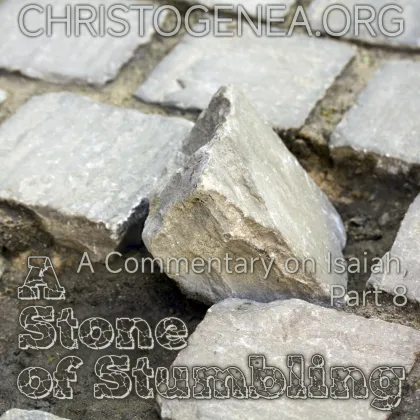
A Commentary on Isaiah, Part 8: A Stone of Stumbling
In Isaiah chapter 7 it is described that Ahaz, King of Judah, had been vexed by the kings of Israel and Aram, or Syria. With that, we had examined the historical accounts of Scripture in the books of Kings and Chronicles, wherein it is described that both kings working together in an alliance had invaded Judah, killed many tens of thousands of men in battle, and had taken many of the people into captivity. The scale of the war which they made with Judah was not fully reflected in the words of Isaiah, which were directed personally towards Ahaz himself. But in the historical books it also becomes evident that Yahweh had humbled Judah on account of the sins of Ahaz, who had led the kingdom much deeper into idolatry than it had been in the days of his fathers. But in spite of those sins, and in spite of the great harm which had come upon Judah, here in Isaiah Ahaz had been granted mercy, and Yahweh had promised him deliverance from those hostile kings, who had even sought to kill and replace him. As a sign of this forthcoming deliverance we read in verse 14 that “Therefore the Lord himself shall give you a sign; Behold, a virgin shall conceive, and bear a son, and shall call his name Immanuel.”
But this Immanuel was a sign, and the child should not be confused with the method by which Ahaz would be delivered. In the text of the passage in chapter 7, it is said that “16 … before the child shall know to refuse the evil, and choose the good, the land that thou abhorrest shall be forsaken of both her kings.” Therefore the child would only be an infant when the kings of Israel and Aram would be removed. So we should not confuse this child with the king of Assyria through whom the removal had come, or with any historical figure of the period, since the child is otherwise unknown and unidentified in Scripture – except for what we are about to see here in Isaiah chapter 8. We have also stated that this child cannot be the good king Hezekiah, the son of Ahaz, as some commentators have imagined, since Hezekiah must have been born before Ahaz his father had become king, and now Ahaz has already been king for at least a couple of years and the child is still not born. That is made evident where Hezekiah became king at age twenty-five after his father had ruled for only sixteen years, as we have already elucidated from Scripture.
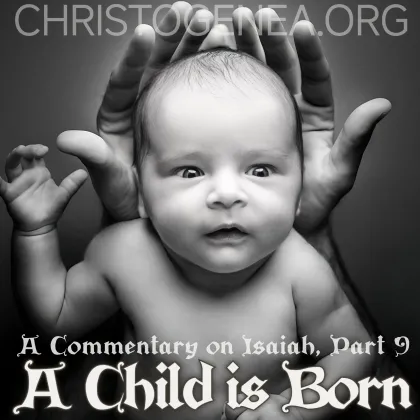
A Commentary on Isaiah, Part 9: A Child is Born
Thus far in these first 8 chapters of Isaiah, there have been condemnations of both Israel and Judah, and similar condemnations shall be found repeatedly throughout the first 40 chapters of the words of the prophet. But if one were to sit and read Isaiah through all at once, this seems repetitious, and it may seem that at least some of the language is repeated unnecessarily. But we must bear in mind that during the life of the prophet himself, the prophecies recorded in these chapters happened over the space of as many as fifty years. So elements of his message were repeated frequently, but it was indeed necessary to present such a testimony to the people of Judah over that long span of time.
Isaiah had begun prophesying these things during the reign of Uzziah, and through the reigns of three generations of his sons who had followed him, Jotham, Ahaz, and Hezekiah, who is last mentioned in Isaiah chapter 39. There Isaiah had informed Hezekiah that his own sons and all of his riches would be taken into captivity to Babylon. Of course, that did not happen for nearly another hundred and twenty years, and we do not know whether Isaiah had outlived Hezekiah, who would live for another fifteen years from that point. But if Jotham and Ahaz had each ruled for sixteen years, discounting the possibility of coregencies, and since the fourteenth year of Hezekiah is mentioned in Isaiah chapter 36 and made evident again in chapter 38, then the prophet had been prophesying for nearly fifty years by that time. Then some time after that, he had written the last twenty-six chapters of his book, which are addressed to Israel in captivity.
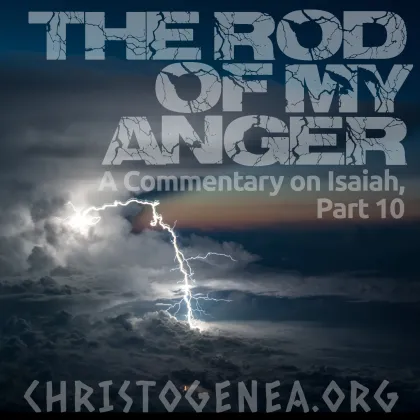
In the last presentation of our commentary on Isaiah, titled A Child is Born, we had mainly sought first to rectify the understanding of the phrase “Galilee of the Gentiles”, or correctly, circuit of the nations, in prophecy, and to illustrate the reasons for its dual meaning, since within the greater context and scope of the prophecy of Isaiah it refers to something other than its later colloquial use in reference to the aliens who had come to dwell in and around Galilee during the intertestamental period, among whom portions of the people of ancient Judah who returned from the Babylonian captivity had later settled. It is in that later historical context in which the apostle Matthew had interpreted the passage in reference to Christ, which is appropriate for His time, however the phrase itself must have had another meaning in reference to the tribes of Naphtali and Zebulun, as Isaiah had presented it here.
So in the time of Isaiah, the prophecy at the beginning of chapter 9 could not have applied to the region of Galilee in the short term. That is because in Isaiah chapter 7, it is evident that at this time Pekah is king in Israel, and the prophecies in Isaiah chapters 7 and 8 had promised his removal in a very short time. So in the near vision, which is the immediate fulfillment of those prophecies, we read in 2 Kings chapter 15: “29 In the days of Pekah king of Israel came Tiglathpileser king of Assyria, and took Ijon, and Abelbethmaachah, and Janoah, and Kedesh, and Hazor, and Gilead, and Galilee, all the land of Naphtali, and carried them captive to Assyria. 30 And Hoshea the son of Elah made a conspiracy against Pekah the son of Remaliah, and smote him, and slew him, and reigned in his stead, in the twentieth year of Jotham the son of Uzziah.” As we have already discussed, in his own inscriptions Tiglathpileser had boasted of having set Hoshea on the throne of Israel himself.
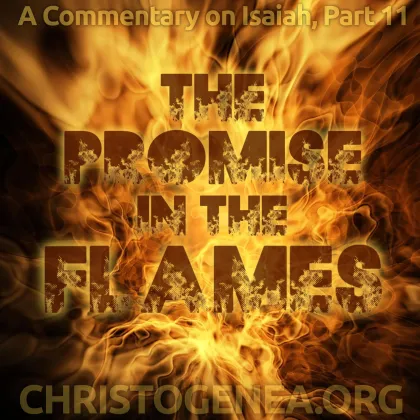
A Commentary on Isaiah, Part 11: The Promise in the Flames
As we have already discussed at length, in Isaiah chapter 7 Ahaz king of Judah was given a sign, that a virgin would conceive a child, and that before the child could eat solid food, or before he could call out to his mother or father, that the kings of both Israel and Syria would be cut off. This judgment upon those kings was described in several different ways, even in chapter 9 where the birth of the child was announced. But there is something much greater being prophesied here, because in spite of the fact that the sign which had been promised to Ahaz was fulfilled, in chapter 9 we read that this child would be a ruler who would sit upon the throne of David and have no end to the increase of his government and peace, that he would forever establish his kingdom with judgment and with justice, and that his name would be called Wonderful Counsellor, the mighty God, the everlasting Father, and the Prince of Peace.
But at the very same time, the children of Israel had also been warned that their kingdoms would be destroyed, and that for their sins they would either perish or be taken into captivity. So the child described in chapter 9 is not the same child who fulfilled the promise of a sign to Ahaz made in chapter 7. In fact, the child, Mahershalalhashbaz, was a son of Isaiah himself, and he was not in line to succeed to the throne of David. Since from this point forward both the Bible and history are silent concerning Mahershalalhashbaz, he could not have been the child which the prophecy in chapter 9 had described.
Rather, the child of chapter 9 is a future Messiah, a promise of Yahweh God come in the flesh to rule His people forever, at some point in the distant future because in the meantime, Israel and Judah were destined to suffer greatly, and also to remain in a period of blindness, or darkness. For example, in Isaiah chapter 8 Yahweh had attested that He “17 …hideth his face from the house of Jacob… 22 And they shall look unto the earth; and behold trouble and darkness, dimness of anguish; and they shall be driven to darkness.” While Ahaz had a temporary comfort in Mahershalalhashbaz, the true Light would be far in the future, and Israel would suffer in the meantime. But as we shall see, there is hope and a promise in the flames of their trials.
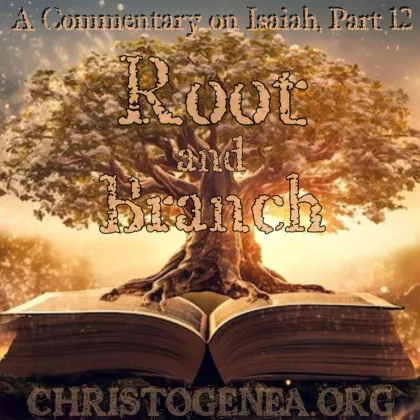
A Commentary on Isaiah, Part 12: Root and Branch
As we had explained at length in our introduction to the later portion of Isaiah chapter 10 and The Promise in the Flames, or the promises which had been given to Israel as the twelve tribes were about to go into captivity, throughout these chapters of Isaiah, where both Israel and Judah are repeatedly condemned and destined to go into captivity, there are also many repeated promises of salvation, and that salvation would ostensibly be achieved through the birth of a child who would be called “the mighty God, the everlasting Father, [and] the Prince of Peace”, among other things which apparently could only describe Yahweh God Himself even if this child would be born of a woman just like any other ordinary man.
In Isaiah chapter 10 we had seen a prophecy warning that Assyria would be destroyed, and assuring the children of Israel that once in captivity, they would escape and even have a part in the destruction of their captors. From the time that Isaiah uttered this prophecy, it would be as many as a hundred and twenty years before Assyria was destroyed around 612 BC. But Jerusalem was also destined for captivity in the words of the prophet, and up to this point, explicit examples of such prophecies concerning Jerusalem are found in the parable of the vineyard of Isaiah chapter 4, and the parable of blindness in Isaiah chapter 6. So if it seems that Jerusalem had escaped its fated captivity once Assyria had fallen, Isaiah had also prophesied concerning Babylon, in chapters 13 and 14, and later, in the closing verses of chapter 39, Isaiah warned Hezekiah that his sons “shall be eunuchs in the palace of the king of Babylon.” So Jerusalem would indeed go into captivity, even it it did not fall to the Babylonians until about 586 BC.
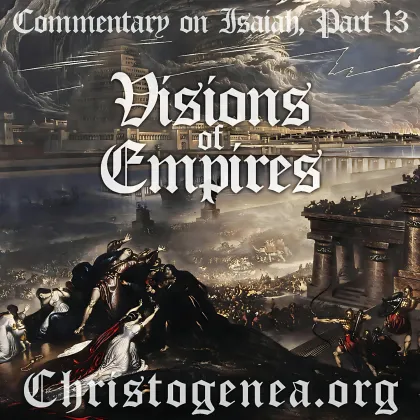
A Commentary on Isaiah, Part 13: Visions of Empires
Discussing Isaiah chapter 11, there is a prophecy of a rod which would come forth “out of the stem of Jesse,” and in an apparent Hebrew parallelism, also a branch which would “grow out of his roots.” Then where this phenomenon is described further, it becomes apparent that the branch is a man: “a root of Jesse, which shall stand for an ensign of the people; to it shall the Gentiles [Nations] seek: and his rest shall be glorious.” It is even more evident that this rod is a man, for example where it says that “he shall smite the earth with the rod of his mouth, and with the breath of his lips shall he slay the wicked” and then “righteousness shall be the girdle of his loins, and faithfulness the girdle of his reins.” But the language indicates that the man is both the origin of Jesse, and a descendant of Jesse. Therefore this man can only be one and the same as the child who had been prophesied earlier in Isaiah, in chapter 9, who would be called the “mighty God”, the “everlasting Father” and the “Prince of Peace.”
No other man could fulfill the plain meanings of all of these statements unless the promised Messiah is God incarnate. So in language which further illustrates this assertion, here in Isaiah chapter 11 this Root of Jesse is also prophesied to “recover the remnant of his people” from all of the places to where they had gone in their captivity, and only Yahweh God would have the authority and the ability to do that. Furthermore, at this point in the time of Isaiah, the promise to regather His people comes even before most of them are taken into captivity. Then, accompanying that promised regathering, there is also a promise of great peace, and the child of Isaiah chapter 9 would be called the Prince of Peace.

A Commentary on Isaiah, Part 14: Lucifer, Son of the Morning
The Roman Catholic images of a fallen angel named Lucifer have permeated Christian society for at least fifteen hundred years, but they are related far more closely to the allegorical images which are found in ancient Mesopotamian carvings than they are to the truths of Scripture. The epithet Lucifer, which is known only from Isaiah chapter 14, does not actually exist in the original language of Scripture, and the words from which the epithets were formed were used in reference to a man, and not as an address for some mystical and supernatural demon or fallen angel. They were used to describe a certain and then-future king of Babylon, whom we would assert could represent any king of any world empire at any given time, a man standing in opposition to God, and not some other-worldly adversary with super-human powers.
The Roman Catholic visions of Lucifer actually detach the Biblical warnings from the realities of everyday life, and the context here in Isaiah concerns the punishment of the children of Israel for their sins. Lucifer does indeed exist, and has existed throughout all of history, but as a man, or as a long series of men, the nature of which the Roman Catholic fables have forever prevented Christians from understanding. The true meaning of the words requires an understanding of ancient history as well as the Biblical context which is found here in the surrounding text of Isaiah. Having obfuscated the meaning of the term Lucifer, the popes of the Roman Catholic Church have actually quite often fulfilled the role of Lucifer, through which they have pretended to be the light-bearers for Christian society while they have actually stood in opposition to Christ. But the people never noticed, because they saw Lucifer as some far-off and mystical, ethereal demon.
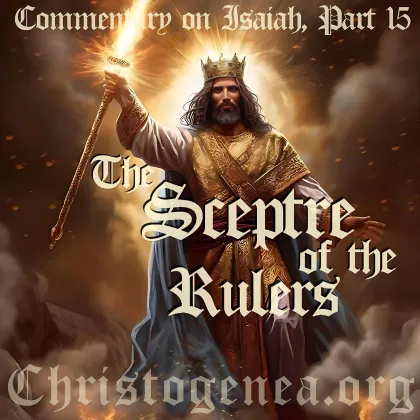
A Commentary on Isaiah, Part 15: The Sceptre of the Rulers
There are many examples in Scripture which exhibit the fact that Yahweh God punishes those whom He has employed in the chastisement of His children. This is fully apparent in Isaiah chapter 10, where the Word of Yahweh had declared: “5 O Assyrian, the rod of mine anger, and the staff in their hand is mine indignation.” But then, just a few verses later in that chapter, Yahweh had attested: “12 Wherefore it shall come to pass, that when the Lord hath performed his whole work upon mount Zion and on Jerusalem, I will punish the fruit of the stout heart of the king of Assyria, and the glory of his high looks.” Likewise, here and throughout subsequent chapters of Isaiah, the destruction of Babylon is prophesied, but evidently not until Babylon had, or has, also been utilized in the punishment of the children of Israel. So in Isaiah chapter 39, the prophet was told to warn Hezekiah king of Judah, in part: “6 Behold, the days come, that all that is in thine house, and that which thy fathers have laid up in store until this day, shall be carried to Babylon: nothing shall be left, saith the LORD.” Then later, in Isaiah chapter 43 we read: “14 Thus saith the LORD, your redeemer, the Holy One of Israel; For your sake I have sent to Babylon, and have brought down all their nobles, and the Chaldeans, whose cry is in the ships.”
Although it is on a smaller scale, this same pattern is evident in the earliest records of the history of Israel, particularly in the book of Judges, where at diverse times the Philistines, Midianites, Canaanites, Moab, Ammon and others had all been employed at one time or another to chastise Israel, and ultimately each of them had been overcome and diminished by Israel, once Yahweh decided that the chastisement was sufficient and He permitted Israel to prevail. For example, in Judges chapter 3 we read: “7 And the children of Israel did evil in the sight of the LORD, and forgat the LORD their God, and served Baalim and the groves. 8 Therefore the anger of the LORD was hot against Israel, and he sold them into the hand of Chushanrishathaim king of Mesopotamia: and the children of Israel served Chushanrishathaim eight years. 9 And when the children of Israel cried unto the LORD, the LORD raised up a deliverer to the children of Israel, who delivered them, even Othniel the son of Kenaz, Caleb's younger brother. 10 And the Spirit of the LORD came upon him, and he judged Israel, and went out to war: and the LORD delivered Chushanrishathaim king of Mesopotamia into his hand; and his hand prevailed against Chushanrishathaim.” The name Chushanrishathaim apparently means “twice wicked Cushan”, and the word Cushan seems to be a reference to the land of Cush in Mesopotamia, as it also does where the word appears in Habakkuk chapter 3. So Chushanrishathaim is not even a name, but only an epithet by which the writers of Judges decided to describe a certain Mesopotamian king.
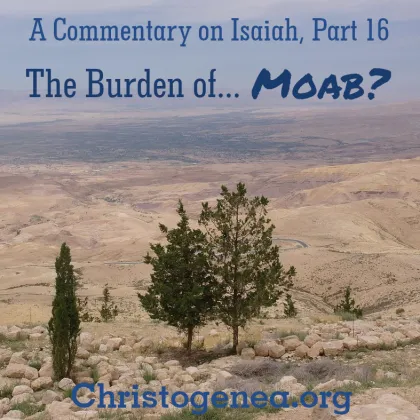
A Commentary on Isaiah, Part 16: The Burden of… Moab?
Discussing Isaiah, before we move on from the prophecies of the destruction of Babylon and the fall of the king of Babylon which are found in Isaiah chapters 13 and 14, it should be noted that at the end of Isaiah chapter 14, in verse 25, there is a shift in focus from Babylon back to Assyria, the demise of which Isaiah had already prophesied in chapter 10. Then in verse 28 there is an odd break in the context where Isaiah mentioned that this burden, referring to the prophecy of doom of Babylon, had come to him in the year of the death of Ahaz king of Judah. Here it is unclear, as to whether the reference to the death of Ahaz was spoken in relation to the burden against Babylon which had preceded, or to that which would follow, beginning with four verses at the end of the chapter in which Isaiah had warned Palestine of its coming destruction. It is more likely to have been a parenthetical remark, since with all certainty the warning to Palestine here is contextually connected to the mention of Assyria a little earlier in the chapter. By itself, this also seems to suggest that the fate of Babylon is tied to the fate of Assyria, and that association is strengthened as the chapter proceeds.
So immediately following the mention of the death of Ahaz, there are four verses containing the warning for Palestine, and within them there is revealed one significant element of the nature of these empires, where it states in verse 29: “Rejoice not thou, whole Palestina, because the rod of him that smote thee is broken: for out of the serpent's root shall come forth a cockatrice, and his fruit shall be a fiery flying serpent.” The “rod of him that smote thee” would be a reference to Assyria, which had reduced and subjected Palestine beginning with the reign of Tiglath-Pileser III, who listed Philistia among his tributaries in inscriptions from the 17th year of his reign. [1] As we have also discussed, that is very close to the time when Ahaz had died, and Tiglath-Pileser had met his own end after having ruled for eighteen years.
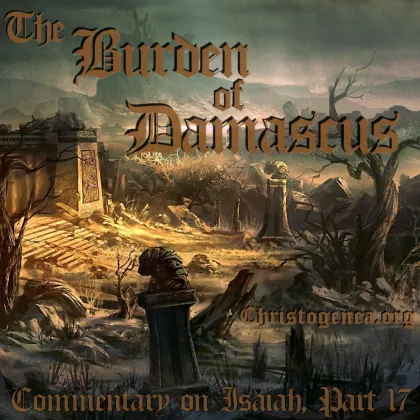
A Commentary on Isaiah, Part 17: The Burden of Damascus
As we hope to have demonstrated discussing the Burden of Moab and Isaiah chapters 15 and 16, the prophecy actually concerns the children of Israel who had dwelt in the land of Moab, the northern portion of the original land of Moab which the Moabites had first lost to the Amorites, and which the children of Israel had later taken for themselves in the days of Moses. This is because all of the cities mentioned in the prophesy were in the lands which were occupied by the tribes of Reuben and Gad, with the possible exceptions of Ar and Kir. However the children of Israel had long held the Moabites themselves as a subject state, and it is plausible that Israelites had also dwelt in those places, after an occupation of nearly 300 years from the time of David. But it is also possible that since Ar and Kir are generic terms, they very likely also applied to Israelite cities in other ways. For example, the Ar mentioned in the opening verses of Isaiah chapter 15 is very likely a reference to the city Aroer found on the banks of the river Arnon, a town of Reuben which is mentioned in Joshua chapter 13. While the name Ar simply means city, Aroer means ruins, so it could also be a pejorative for any city. It is used as a pejorative here in a different context in Isaiah chapter 17.
As a digression, this interpretation of the use of the term Moab, which is fully substantiated in Isaiah chapters 15 and 16, also supports our interpretation of the Book of Ruth, and our assertion which is based on several points of evidence within that book, that Ruth was an Israelite in Moab, who was only called a Moabite because of the circumstances of her geographic origin. So if the tribes of Reuben and Gad were called Moab here by the prophet, for reason that they were Israelites dwelling in Moab, then Ruth was also an Israelite dwelling in Moab, as the internal evidence suggests. Certainly Boaz, a pious man, and the elders of Israel with him, portrayed as having been pious men, were also all described as having upheld the law of Moses, so it is not just to imagine that they would transgress that same law of Moses by bringing a racial Moabitess into the congregation, which is contrary to the law. One law cannot force a man to transgress another.
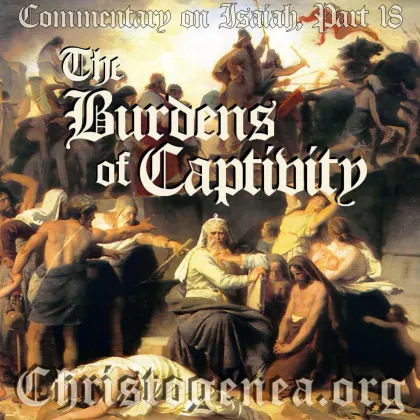
A Commentary on Isaiah, Part 18: The Burdens of Captivity
In our most recent commentaries for Isaiah, presenting chapters 16 and 17 we had discussed the fact that the burdens which the prophet had for Moab and Damascus had actually addressed the Israelites who were settled in the ancient lands of Moab and Damascus. Then as we had progressed through each of these burdens, it had become more and more apparent that they had actually been for Israelites.
For example, in Isaiah chapter 16 where there is a promise of mercy, we read: “5 And in mercy shall the throne be established: and he shall sit upon it in truth in the tabernacle of David, judging, and seeking judgment, and hasting righteousness”, and all of the cities of Moab which had been named in that chapter were cities in Moab that had been occupied by the children of Israel from the days of Moses and Joshua, for roughly 700 years.
Then, in chapter 17, in verse 10 we read in part: “10 Because thou hast forgotten the God of thy salvation, and hast not been mindful of the rock of thy strength, therefore shalt thou plant pleasant plants, and shalt set it with strange slips”, and it is clear that since Yahweh was the God of Israel and was only known by Israel in that sense, the words of the prophet had addressed Israelites in Damascus, and not merely Syrians who never knew Yahweh so that they could have forgotten Him.
Likewise it shall be here, in Isaiah chapter 18, that the words of the prophet are addressing at least a portion of the Israelites in captivity, and in chapter 19, while Egypt is a subject of the Burden of Egypt prophecy in the immediate sense of the prophet, which is the near vision, in the far vision Egypt stands an allegory for the captivity of Israel, and a portion of Israel is being addressed as Egypt.
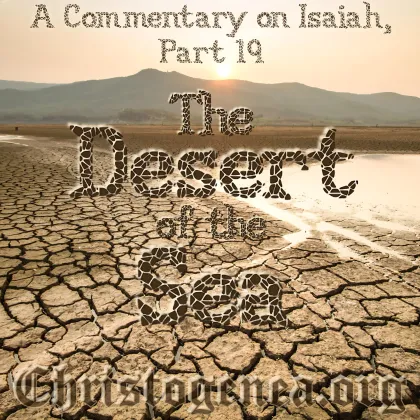
A Commentary on Isaiah, Part 19: The Desert of the Sea
In the King James Version of the Bible, the Hebrew name כושׁ or Kush (# 3568) is usually translated as Ethiopia. Exceptions to this are found only in the genealogy of the sons of Ham, in Genesis chapter 10, and in the copy of that genealogy which is repeated in 1 Chronicles chapter 1, where the personal name Kush is properly transliterated as Cush. This is a cause of confusion, because the Cush of Genesis chapter 10 was certainly the patriarch of the tribe of Cush which had inhabited Mesopotamia and parts of the adjacent land to the west which had later become known as Arabia. Cush also inhabited parts of the lands of east of the Tigris River which eventually became part of later Persia. However in modern times the word Ethiopia is only associated with the land to the south of Egypt in Africa.
Doing this, the King James translators had only followed the same convention which had been used in the much earlier Greek Septuagint translation of Scripture. There, in the genealogies found in Genesis chapter 10 and in 1 Chronicles chapter 1 the name was rendered as Χους or Chous in Greek. But everywhere else in the Septuagint, the name is rendered with some form of the word Αἰθιοπία or Ethiopia. Interestingly, the Greek word χοῦς is a common noun which was either a unit of measure, or it was used to describe dust or soil.
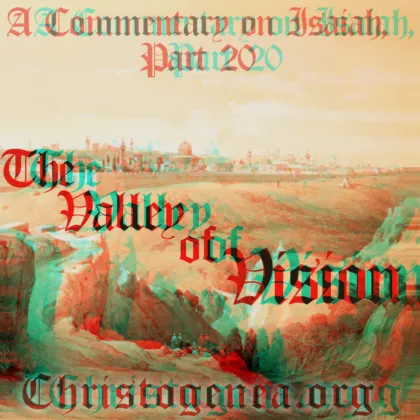
A Commentary on Isaiah, Part 20: The Valley of Vision
Having left off in our last presentation with the burden of The Desert of the Sea in the middle of Isaiah chapter 21, we are coming to the end of a series of prophecies which had begun in Isaiah chapter 13 with the burden of Babylon, and, on the surface, the burdens seem to have been against all of the nations or places surrounding ancient Judah. Yet in the course of our discussion we hope to have demonstrated that even though they seem to be quite enigmatic, many of them are actually relevant to the children of Israel, and many of them are even more relevant to the far vision of the future of Israel, from Isaiah’s time, rather than to the immediate circumstances and events which had befallen them in ancient times.
So for reasons which we have already explained, the burden of Babylon is apparently more relevant to the future world empires and the entity known as Mystery Babylon in the Revelation, than it was to the short-lived empire of Nebuchadnezzar, and the burden against the king of Babylon is relevant to all of the rulers of that same long line of empires which had been in Isaiah’s future. The burden of Moab was actually directed towards the Israelites who had dwelt east of the River Jordan, the burden of Damascus towards the Israelites who dwelt in Syria, and the oracle for “the land shadowing with wings” was meant for Israelites of the Assyrian captivity, while the burden of Egypt served as a warning to the remaining people of Judah, not to flee to Egypt for refuge from the coming Assyrians. The last of these burdens that we have already discussed is the “burden of the desert of the sea”, which we had described as having represented the general mass of the world’s peoples who, in the near vision, would face the coming rise of the empire of the Persians and the Medes. So in that sense, it was another prophecy against Babylon, and therefore the declaration that Babylon is fallen was made near its end.
Christogenea is reader supported. This month's support level is reflected in the graph below. See our Contact page for a mailing address and other ways to support Christogenea.
100%